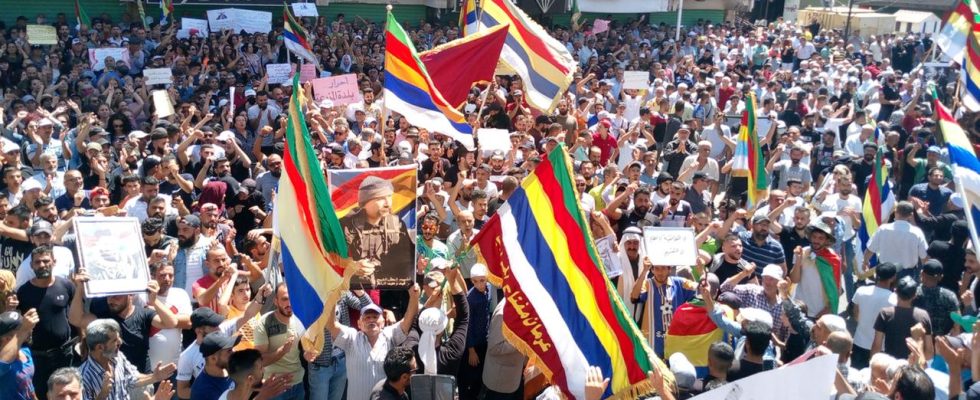background
They speak Arabic, have their own flag and have been neutral towards the state for a long time: the Syrian Druze. Some now dare to rebel. Is this dangerous for Assad’s power apparatus?
Green, red, yellow, blue, white. At first glance, the colorful flag waved on the streets of the Syrian city of Suweida is reminiscent of the rainbow flag. If you look closely it becomes clear: it is the flag of the Druze.
Women, mostly with loose hair, as well as hundreds of men with conical white hats and impressive mustaches are openly protesting against the Syrian government.
“The people want the system to be overthrown,” Druze have been chanting almost daily since mid-August. Poor living conditions, rising prices and the government’s cuts in fuel subsidies are the reasons why their anger is being unleashed against ruler Bashar Al-Assad.
They came to terms with Assad
For many years there were no demonstrations by the Druze religious minority against the president. Ruler Assad is also part of a minority in Syria; he is an Alawite. He likes to present himself as a protector of the Syrian minorities in the fight against Islamist groups.
Many Christians, Shiites and Druze came to terms with Assad after the 2011 uprisings and remained neutral, especially in the early days of the twelve-year war.
Community survival
To date, around 700,000 Druze live in the south of the country around Jebel ed-Druze, the Druze mountain. Another 20,000 in the Israeli-annexed Golan Heights. They believe in reincarnation and combine elements of the great monotheistic religions and Greek philosophy.
They are considered esoteric, mystical, mysterious. Some Islamic scholars see them as Muslims, others see the Druze as apostates. It is a small religious community with a clear goal in a contested region.
“Druze politics is always about the survival of the community,” analyzes Joseph Bahout, professor at the American University in Beirut. Hundreds of thousands of Druze also live in Syria’s neighboring countries, Lebanon, Israel and Jordan.
Between the large religious communities of Sunnis, Shiites, Christians and Jews, Druze usually act politically cautiously and pragmatically, according to Bahout.
Don’t venture too far out of cover
Druze themselves often form armed militias to defend their towns and villages, as is currently the case in Suweida. In the past, they have mostly avoided direct confrontation with national security forces due to military inferiority.
Their rhetoric can be harsh, as is currently the case in Syria. But expert Bahout is certain: In the inner Druze power circles, political leaders warned the activists on Suweida’s streets of a major conflict with Assad’s power apparatus.
It is a tightrope act for the Druze. Many people didn’t want to venture too far out of cover for fear of a bloody confrontation. “It’s a small community. They should try everything to avoid bloodshed among young Druze,” says Bahout. On the other hand, Druze in Syria are considered influential, with good connections in the military.
Numerous officer positions in the Syrian army are held by Druze. And they know: Assad doesn’t seem to care much about a violent conflict either, as it would severely damage his image as a protector of the minorities.
Deal behind the scenes
A better economic deal with Damascus seems possible; the government is said to have already offered the Druze cheap gasoline. Observers are certain that negotiations between the Syrian government and Druze leaders have been going on behind the scenes for a long time.
But Assad’s government can no longer be sure of the loyalty of the Druze, as the protests have clearly shown. Hundreds of demonstrators waving the colorful Druze flag – these are powerful images. However, the Druze alone probably do not have the strength to pose a political threat to Assad’s power apparatus.

